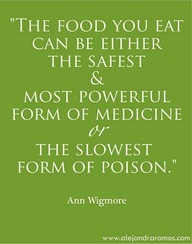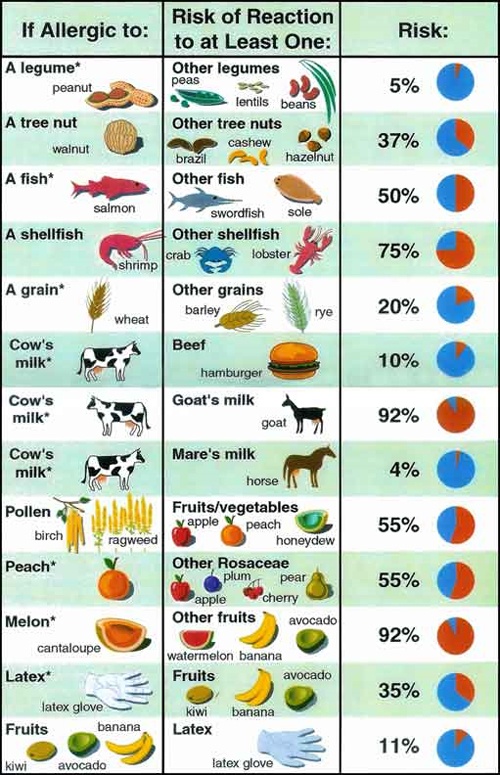
Approximately three fourths of the population experience food sensitivities. A smaller portion experience food allergies. Allergies are very apparent - the symptomology displays itself as hives, difficulty breathing, and severe digestive complaints. Food sensitivities are less obvious. A person with a food sensitivity may experience any of the following:
Food sensitivities can be caused by many factors. Primarily it is caused when a body is out of balance. The body's immune system recognizes foods as toxins, and fights against having the substance in the system. Eating the same food continuously can also lead to a sensitivity. Milk is an example of this and so is corn syrup. Corn syrup is added to the majority of processed foods. Some common food sensitivities are:
In the standard American diet (SAD), the diet centers on a few foods such as dairy products, corn, wheat, and sugar. Our bodies require four or more days between eating foods that we are sensitive to in order for our tissues to recover. If you eat the foods you are sensitive to everyday, it is like having a sore that is constantly irritated, and it doesn't allow the body to heal.
Allergies cause inflammation of the system. The reason that symptoms can be so diverse is that the inflammation can show up in any body part (joints, brain cells, skin, lungs, etc.). Food sensitivities need to be addressed so discomfort doesn't turn into a disease process. The reason that sensitivities are difficult to pinpoint is because a person may not have a reaction to a food substance until up to 48 hours after ingesting it. Food sensitivities can also cause inflammation of the bladder. This can result in bedwetting and frequent urination.
One way to self check for a food sensitivity is to take a baseline pulse for one minute in the morning. Fifteen minutes after ingesting a food or beverage, take your pulse again. If your hear rate has gone up 20 or beats, it is a good indication of a food sensitivity. The difficulty with this is that a food should be eaten in isolation to determine if it is a sensitivity. You should not feel better or worse from eating any particular food, so if you are getting an immediate reaction to a food, a sensitivity is most likely the culprit. People also tend to crave some of the foods that they are sensitive to. This can be due to toxins in the system, or the body trying not to go into withdrawal from the food that is sensitive. In the case of food allergies and sensitivities, I highly recommend electrodermal screening. As a technician, I have seen people overcome sensitivities by giving the body the proper balance of vitamins, minerals, essential fatty acids and enzymes, and by removing toxins from the system.
-Food Sensitivity Information-
What are Food Sensitivities?
When you have an allergy to a food, you tend to know immediately due to the quick symptoms that appear (rash, hives, headache, breathing difficulties). Food sensitivities are more invasive because they can be related to leaky gut syndrome instead of an immune response. The reaction from eating a food that you are sensitive to can show up from up to one hour to three days after you eat the offending food. As an example, if you are sensitive to monosodium glutamate (a flavor enhancer in more and more foods), you may get a headache a couple hours after eating it, or you may feel the need for a nap. Additional symptoms that people don’t necessarily attribute to foods, because the symptoms show up at a later time include the following:
Causes of food sensitivities can be attributed to parasites, molds, yeasts, funguses, bacteria and other toxins that can cause a leaky gut. Stress and intestinal inflammation can also be factors in food sensitivities. I highly recommend electrodermal screening to help identify food sensitivities and the offending stressors and toxins that may be causing the sensitivities.
- Fatigue
- Gas
- Diarrhea
- Bloating
- Agitation
- Colitis
- Depression
- Insomnia
- Headaches/Migraines
- Ulcers
- Eczema
- Overweight
- Candidasis
- Sinus Issues
- Mental Confusion
- Phlegm build up
- Bedwetting (food sensitivities can cause the bladder to swell leading to frequent urination)
- Colic
- Digestive disorders
- Tingling/numbness in limbs
- Respiratory issues
- Joint pain
- Irritability
- Acne, hives, psoriasis
- Hyperactivity
- Poor concentration
- Indigestion
- And much, much more…
Food sensitivities can be caused by many factors. Primarily it is caused when a body is out of balance. The body's immune system recognizes foods as toxins, and fights against having the substance in the system. Eating the same food continuously can also lead to a sensitivity. Milk is an example of this and so is corn syrup. Corn syrup is added to the majority of processed foods. Some common food sensitivities are:
- Pasteurized Milk
- Alcohol
- Coffee
- Corn Syrup
- Aspartame
- Fish
- Pork
- Sugar (sucrose)
- Shellfish
- Olives/Olive
- Oil
- Eggs
- Preservatives
- Corn and Corn Derivatives
- Soy
- Colorings
- MSG (monosodium glutamate and other glutamates)
- Oranges
In the standard American diet (SAD), the diet centers on a few foods such as dairy products, corn, wheat, and sugar. Our bodies require four or more days between eating foods that we are sensitive to in order for our tissues to recover. If you eat the foods you are sensitive to everyday, it is like having a sore that is constantly irritated, and it doesn't allow the body to heal.
Allergies cause inflammation of the system. The reason that symptoms can be so diverse is that the inflammation can show up in any body part (joints, brain cells, skin, lungs, etc.). Food sensitivities need to be addressed so discomfort doesn't turn into a disease process. The reason that sensitivities are difficult to pinpoint is because a person may not have a reaction to a food substance until up to 48 hours after ingesting it. Food sensitivities can also cause inflammation of the bladder. This can result in bedwetting and frequent urination.
One way to self check for a food sensitivity is to take a baseline pulse for one minute in the morning. Fifteen minutes after ingesting a food or beverage, take your pulse again. If your hear rate has gone up 20 or beats, it is a good indication of a food sensitivity. The difficulty with this is that a food should be eaten in isolation to determine if it is a sensitivity. You should not feel better or worse from eating any particular food, so if you are getting an immediate reaction to a food, a sensitivity is most likely the culprit. People also tend to crave some of the foods that they are sensitive to. This can be due to toxins in the system, or the body trying not to go into withdrawal from the food that is sensitive. In the case of food allergies and sensitivities, I highly recommend electrodermal screening. As a technician, I have seen people overcome sensitivities by giving the body the proper balance of vitamins, minerals, essential fatty acids and enzymes, and by removing toxins from the system.
-Food Sensitivity Information-
- Many times, people who are sensitive to pasteurized milk mistakenly believe that they are lactose intolerant. There are times when only the milk is the issue, due to the pasteurization process or because of the numerous proteins found in milk. The molecules in milk are difficult to digest, because it is a food for an animal that is not our size. That is why goat's milk is easier to digest; because of the size of the animal.
- Orange and hard cheeses are more apt to be a sensitivity to people.
- It is common to be sensitive to foods that you crave and foods that you avoid or dislike.
- Food sensitivities can be improved or eliminated by removing real toxins from the system, such as parasites, molds and funguses, chemicals, pesticides, and heavy metals.
- Sometimes it is not the food that you are sensitive to, but rather the additives and preservatives that are added to the majority of processed foods.
- To alleviate symptoms of food sensitivities, try eliminating the offenders. If this is not possible, try to eat on a rotation diet. Eat foods only every fourth day. This allows the system time to heal in between being exposed to the food.
What are Food Sensitivities?
When you have an allergy to a food, you tend to know immediately due to the quick symptoms that appear (rash, hives, headache, breathing difficulties). Food sensitivities are more invasive because they can be related to leaky gut syndrome instead of an immune response. The reaction from eating a food that you are sensitive to can show up from up to one hour to three days after you eat the offending food. As an example, if you are sensitive to monosodium glutamate (a flavor enhancer in more and more foods), you may get a headache a couple hours after eating it, or you may feel the need for a nap. Additional symptoms that people don’t necessarily attribute to foods, because the symptoms show up at a later time include the following:
Causes of food sensitivities can be attributed to parasites, molds, yeasts, funguses, bacteria and other toxins that can cause a leaky gut. Stress and intestinal inflammation can also be factors in food sensitivities. I highly recommend electrodermal screening to help identify food sensitivities and the offending stressors and toxins that may be causing the sensitivities.

